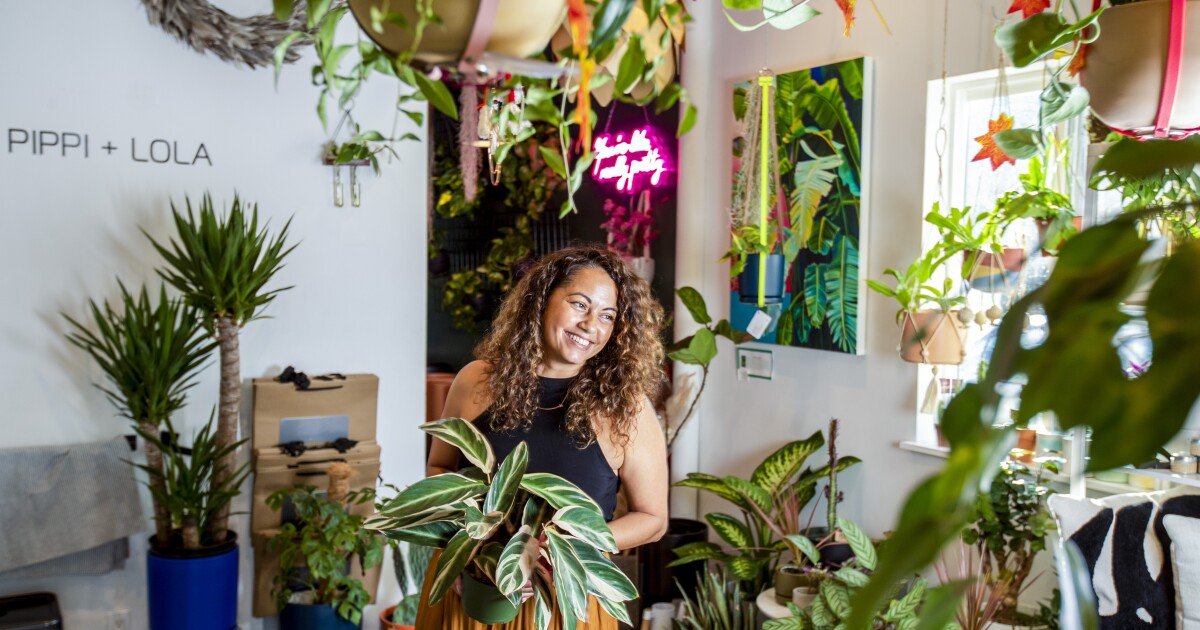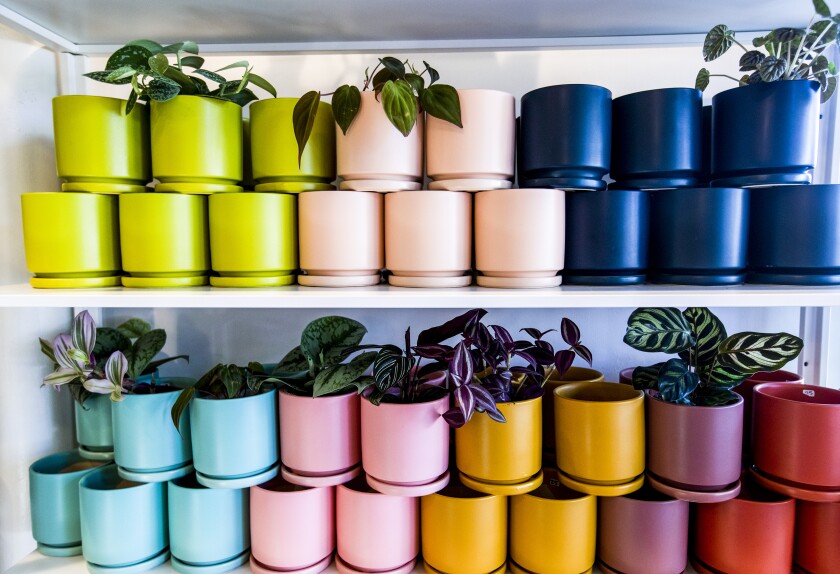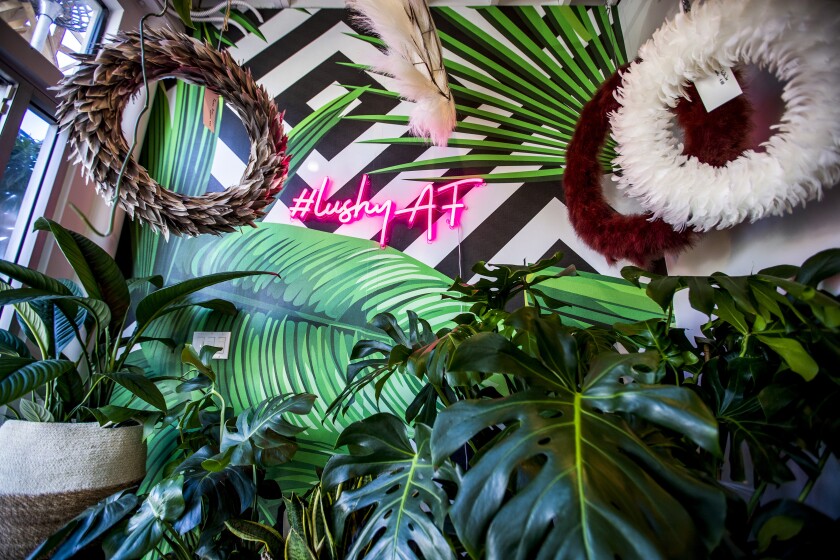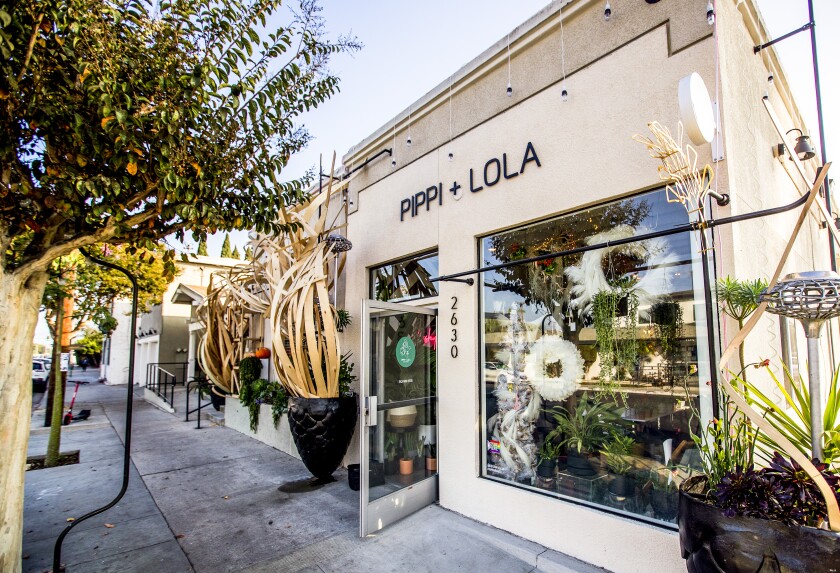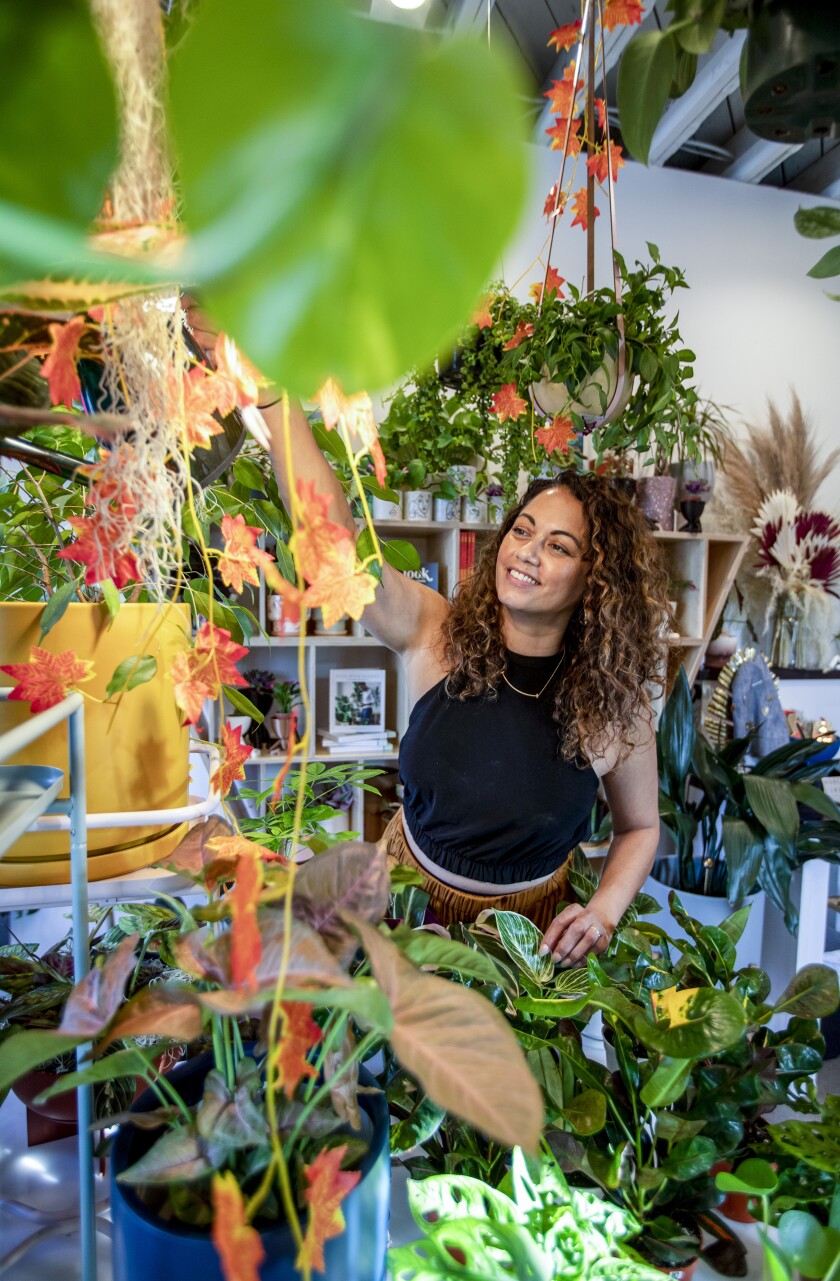This is the latest in a series that we call Plant PPL, where we interview people of color in the plant world. If you have any suggestions for PPL to include in our series, tag us on Instagram @latimesplants.
When Dynelly del Valle’s career as a fashion buyer took another direction, she turned to space design. Then the Miami native says she turned to biophilic design for the simple reason that plants make you feel good.
“When people step into a plant-filled environment, they instantly feel happy,†she says of the lush, plant-filled workspaces she has created. “They are great for your general well-being. “
The same could be said of Pippi + Lola, the Long Beach plant studio she designed as a temporary pop-up after her commercial work dried up. It’s now a permanent fixture among the independent shops and restaurants located along 4th Street in Long Beach. (The studio reopens after a vacation break on January 3.)
Populated by wreaths, unique planters, horticultural books, and of course, plants, Pippi + Lola strives to showcase a diverse group of designers including women and people of color. “There are all these talented women here,†says Del Valle. “Why not show their work? “
I caught up with Del Valle to talk about her recent career pivot, the historic significance of her Long Beach building, and the one houseplant she’ll never get along with.
Dynelly del Valle in his Pippi + Lola plant workshop.
(Allen J. Schaben / Los Angeles Times)
You joke that it took you 15 years to meet another Puerto Rican in Los Angeles. How has your heritage influenced Pippi + Lola and you as a designer?
When it comes to my Puerto Rican heritage, I really feel like it inspires the spaces I create. If I could recreate a tropical rainforest, I definitely would! Puerto Rico is a very beautiful tropical place, and it really speaks of my love of fantasy. I think my admiration for world art in general drives my search for new and inspiring artists, regardless of their culture. I am a world traveler and appreciate cultural differences across all specters.
Books, plants and botanically inspired products at Pippi + Lola.
(Allen J. Schaben / Los Angeles Times)
How did the pandemic inspire your pivot to plants?
The commercial workspace was no longer a thing. I ended up adopting a lot of plants that I used so that they didn’t die off. I was going to visit them at a mixed-use warehouse in Lincoln Heights and finally brought them all home. I had over 100 plants in my house. This is where my slogan “Lushy AF” comes from. I leave a trail of leaves behind me. Or they’re stuck in my hair. I have plants hanging from the ceiling inside the store. You will get lost in the plants here.
So is your store an immersive experience?
I want people to like it or have an emotional response. That’s why I don’t call it a plant store. It’s nothing like that at all. It is a plant workshop.
Planters in a rainbow of colors.
(Allen J. Schaben / Los Angeles Times)
You said the living room had good vibes. How? ‘Or’ What?
When we walked through the back of the building the first thing I saw was a shower as it had been a living room. You could feel the love in there – the positive vibes. The building found me. It was a three-year lease, but I said, “Let’s go. I felt the urge to jump. I felt more excited than anxious. I signed the papers on a Wednesday, received the keys on a Friday and opened on Valentine’s Day.
I learned that the salon owner had babysat her employees for a year during the lockdown to make sure they had food on their tables. Another day, I noticed two gentlemen looking around the studio as I closed. I asked them if they wanted to come in, and they said it was a historic site for them. It was once the seat of the Long Beach AIDS Walk. The reason space called me is because it represents everything we stand for. It was a community center and was owned by a woman who took care of her employees and her community.
Pippi + Lola announces her hashtag.
(Allen J. Schaben / Los Angeles Times)
What is the atmosphere of the store?
I like to organize the space with products owned by women and made by BIPOC. I don’t buy anything commercial because that’s not who we are. There were times when I had three jars left, but that’s how it is when dealing with small businesses. I research my suppliers and make sure we support each other as women, as people of color and as small businesses. I want to make sure our community knows we are here.
Outside of the Pippi + Lola factory studio in Long Beach.
(Allen J. Schaben / Los Angeles Times)
How does it feel to be on 4th Street in Long Beach?
We are a tight-knit group, which is not only great for us but for the community. If I don’t carry something, I will send my clients to someone else. People Can Plant Hops in Long Beach! Every fourth Friday the 4th Street businesses stay open until 9 p.m., and we bring in food vendors, Disney characters, DJs, a VW photo booth – we all do different things.
So you consider your plant workshop as a community space?
Absoutely. Yes, I’m technically a plant shop, but it’s not about plants. I have made so many friends here. People come in and ask for a low light plant and leave after telling me about an aunt who has passed away. Conversations sometimes get deep. This is why the events we organize are so fun.
Why are you calling the store Pippi + Lola?
The name comes from a few plants that we named Pippi and Lola. My partner loves Pippi Longstocking and I love the Barry Manilow song that says, “Her name was Lola, she was a showgirl” so we named the plants and our cars those names and thought they sounded great together. .
Dynelly del Valle, owner of the Pippi + Lola plant studio.
(Allen J. Schaben / Los Angeles Times)
Favorite plant?
Love the Alii ficus and the spurge white ghost cactus. And don’t laugh, but I love the pothos. I really do. They’re always happy and low-maintenance, and I love a low-maintenance houseplant.
There is a plant for everyone, but there are also plants you will never get along with. For me, it’s the spider plant. It is one of the easiest plants to maintain because it multiplies, but we do not get along. And it’s good.
You said you are particular about the plants you choose. Can you give some examples?
It’s personal to me. I want my customers to have a good experience, so I tend to stock plants that are low maintenance. More than half of the customers who walk through the door tell me they don’t have a green thumb. Or they don’t have a lot of time. So I like to focus on things that will be successful. I ask a lot of questions. I definitely have begonias and things that are not for beginners, some plants that are less conventional. I don’t follow the trends. If people are looking for exotic products, I will send them to stores like Foliage in Long Beach. In my studio you will come out with a beautiful plant and an awesome pot. Pots can really make a difference. Some of them are like art; bullion coins. I have carefully preserved them, and most of them cannot be found in any other store. That’s the point. I am a destination.

